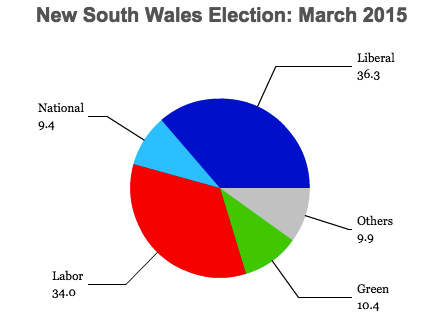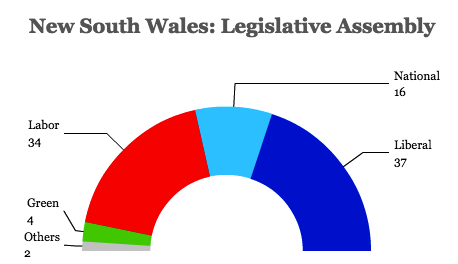After two recent high-profile failures at the ballot box, the center-right Liberal Party is breathing a sigh of relief today with an election victory in New South Wales, Australia’s largest state and the home of Liberal prime minister Tony Abbott.![]()
![]()
Less than a year after Liberal premier Barry O’Farrell resigned over a gift bottle of wine valued at $3,000, his successor Mike Baird won a renewed mandate for the Liberals in Saturday’s state election. That will come as some relief to Abbott, whose rising unpopularity caused a leadership spill in his own caucus in mid-February and whose hold on the Liberal leadership (and premiership) is still somewhat shaky. A Liberal loss in New South Wales, following losses last November in Victoria state and on January 31 in Queensland, would have certainly renewed calls for Abbott’s replacement.
New South Wales was the original name given to the British colony on Australia’s mainland established at Sydney in 1788. Over the decades of the 19th century, the colony was eventually whittled down to the pattern of today’s Australian states and territories. Nevertheless, its 7.4 million residents constitute nearly one-third of Australia’s population today.
Baird’s popularity won’t necessarily make him a direct threat to Abbott. Success at the provincial level in Australian politics only rarely results in a leap to federal politics. Former Labor premier Bob Carr, who served from 1995 to 2005, overseeing the 2000 summer Olympic games in Sydney, made the jump in 2012 only after then-prime minister Julia Gillard appointed him to Australia’s senate as part of his appointment as foreign minister. Moreover, Abbott is personally and ideologically closer to Baird than he was to O’Farrell. He’s far more likely to face a federal leadership challenge from communications minister Malcolm Turnbull or foreign minister Julie Bishop than from Baird.
Like Abbott at the federal level, Baird governs at the provincial level in a longstanding coalition with the National Party. Though the center-left Labor Party gained 11 seats, mostly at the expense of the Liberal/National coalition, which lost eight seats, Baird will continue to enjoy a plurality of seats in the state legislature’s upper house, the Legislative Council, and a strong majority in the lower house, the Legislative Assembly.
Aside from the national implications of Baird’s victory for Abbott’s premiership, one of the most significant results is the growing strength of the Australian Greens, which quadrupled it number of seats (to four) on the strength of over 10% of the vote.
As commentators have been quick to point out, Baird’s overwhelming victory shows that it’s possible for a strongly market-oriented conservative to win popular mainstream support. Baird, who previously served as O’Farrell’s treasurer in the state government, has shown more enthusiasm for enacting reforms, and he ran the 2015 campaign on a pledge to privatize certain aspects of the NSW electricity and power utilities.
At the time of the last federal election, Labor had lost nearly power in every Australian state and territory — with the exception of South Australia, where premier Jay Weatherill narrowly won an election in March 2014. It’s not uncommon, however, for Australians to vote opposition parties into power at the state level, partially as a rebuke to the governing party in Canberra.
Liberals still control Tasmania, where Will Hodgman took power in March 2014, the first Liberal government since 1998, and in Western Australia, where Colin Barnett has served as premier since 2008. Daniel Andrews led Labor to power in Victoria (Australia’s third-most populous state) last year, and Annastacia Palaszczuk became the premier of Queensland (second-most populous) less than two months ago. The dual Labor victories come at a time when Labor, under opposition leader Bill Shorten, have opened a wide lead against Abbott and the Coalition in national polls. Australia must hold an election before January 2017, though it’s common for governments to call fresh elections before the full expiration of their four-year terms.


